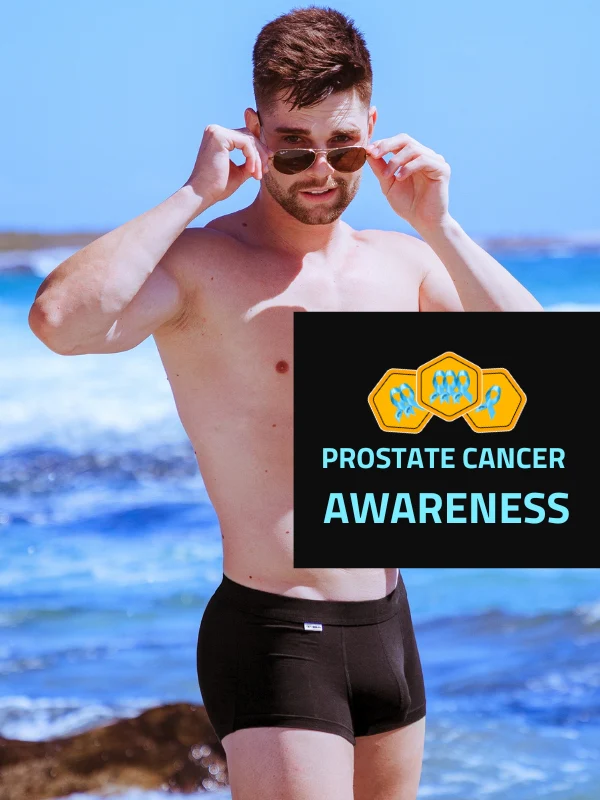
IT'S TIME TO INSPECT THE REAL MAN CAVE 😉
Get up to 70% off by answering Prostate Cancer Trivia now!
Give Your Gonads Some Love
-
The TBô Black Trunk 3-Pack
Regular price CHF 27.79Regular priceUnit price perCHF 41.68Sale price CHF 27.79Sale -
 Sale
SaleThe TBô Brief 3-Pack
Regular price CHF 34.28Regular priceUnit price perCHF 41.68Sale price CHF 34.28Sale -
The TBô Black Boxer Brief 3-Pack
Regular price CHF 32.43Regular priceUnit price perCHF 41.68Sale price CHF 32.43Sale -
The TBô Surf the Web Blue Trunk 3-Pack
Regular price CHF 27.79Regular priceUnit price perCHF 41.68Sale price CHF 27.79Sale -
The Surf the Web Blue Brief 3-Pack
Regular price CHF 32.43Regular priceUnit price perCHF 41.68Sale price CHF 32.43Sale -
The TBô Surf the Web Blue Boxer Brief 3-Pack
Regular price CHF 34.28Regular priceUnit price perCHF 41.68Sale price CHF 34.28Sale -
The TBô Molten Lava Red Trunk 3-Pack
Regular price CHF 27.79Regular priceUnit price perCHF 41.68Sale price CHF 27.79Sale -
The Molten Lava Red Brief 3-Pack
Regular price CHF 32.43Regular priceUnit price perCHF 41.68Sale price CHF 32.43Sale -
The TBô Molten Lava Red Boxer Brief 3-Pack
Regular price CHF 30.57Regular priceUnit price perCHF 41.68Sale price CHF 30.57Sale -
The Lavender Purple Brief
Regular price CHF 18.53Regular priceUnit price perCHF 18.53Sale price CHF 18.53 -
The Hunter Green Trunk
Regular price CHF 18.53Regular priceUnit price perCHF 18.53Sale price CHF 18.53 -
The Must-Have Boxer Briefs Long ( XXL only)
Regular price CHF 18.53Regular priceUnit price perCHF 18.53Sale price CHF 18.53 -
 Sold out
Sold outThe Powder Blue Brief
Regular price CHF 18.53Regular priceUnit price perCHF 18.53Sale price CHF 18.53Sold out -
 Sold out
Sold outThe Powder Blue Trunk
Regular price CHF 18.53Regular priceUnit price perCHF 18.53Sale price CHF 18.53Sold out -
 Sold out
Sold outThe Powder Blue Boxer Brief
Regular price CHF 18.53Regular priceUnit price perCHF 18.53Sale price CHF 18.53Sold out -
 Sold out
Sold outThe Blue Depths Trunk
Regular price CHF 18.53Regular priceUnit price perCHF 18.53Sale price CHF 18.53Sold out -
 Sold out
Sold outThe Blue Depths Boxer Brief
Regular price CHF 18.53Regular priceUnit price perCHF 18.53Sale price CHF 18.53Sold out -
The Must-Have Briefs (Small)
Regular price From CHF 9.26Regular priceUnit price perCHF 18.53Sale price From CHF 9.26Sale -
The Must-Have Trunk (Small)
Regular price CHF 18.53Regular priceUnit price perCHF 18.53Sale price CHF 18.53 -
 Sale
SaleThe Granite Brief
Regular price From CHF 21.26Regular priceUnit price perCHF 41.68Sale price From CHF 21.26Sale
Not-So-Fun Facts About Prostate Cancer
It's one of the most common cancers among men!
Often, it grows slowly and stays confined to the prostate, causing little harm. However, some types can be aggressive and spread quickly. Early detection through screening can greatly improve treatment outcomes..
-
Risk Increases After Reaching The Big 50
Read MoreThe risk of developing prostate cancer ramps up as you get older, especially after hitting the big 5-0. Other biggies include family history and genetic quirks, like those pesky BRCA1 and BRCA2 gene mutations. And here's a curveball: African American men face a higher risk than their counterparts from other racial backgrounds.
-
Early Prostate Cancer Often Has No Symptoms
Read MoreThis is why keeping an eye on things is key for catching it early. As cancer sneaks up, you MIGHT notice trouble peeing, blood showing up where it shouldn’t (like urine or semen), issues in the bedroom, and some serious bone pain. To get the full picture, docs usually whip out a PSA test, go for a Digital Rectal Exam, and if needed, grab a biopsy.
-
Early-stage Prostate Cancer Has A High Survival Rate
Read MoreTreatment options depend on the cancer's stage and the patient's health and preferences. They can include active surveillance, surgery, radiation therapy, hormone therapy, and chemotherapy. Early-stage prostate cancer has a high survival rate, especially when detected and treated early.
While You Can't Phsyically Check Your Own Man Cave
It's Important To Be Aware If You Are At Higher Risk
Causes & Risk Factors of Prostate Cancer
-

Age
Age 50 -59: 1 in 100 men diagnosed.
Age 60 -69: 1 in 14 men diagnosed.
-

Genetics
If father or brother has had prostate cancer you are more than twice as likely to develop it.
-

Ethnicity
African American men are at higher risk and often have more aggressive forms of prostate cancer.
-

Obestiy
Research has shown that obese men have about a 20% to 30% higher risk of developing prostate cancer compared to men with a normal weight.
-

Smoking
Studies suggest that the risk of prostate cancer among smokers is approximately 24% higher than that of non-smokers.
-

Diet
Diets high in saturated fats, often found in red and processed meats, dairy products, and fried foods, have been linked to an increased risk of prostate cancer.



























